 Libri di Lauren Berlant su Unilibro.it
)
Libri di Lauren Berlant su Unilibro.it
)
|
|
2025 |
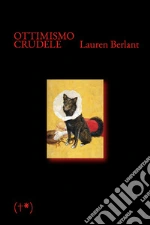 Title :
Ottimismo crudele
Title :
Ottimismo crudeleAuthor: Berlant Lauren Publisher: Timeo (Palermo) Che cosa vuol dire vivere nell'ombra di un sogno irrealizzabile? Crederci, contro ogni evidenza, finché non avrà prosciugato la nostra quotidianità? Languire sperando che le promesse del neo-liberismo - mobilità sociale, sicurezza economica, giustizia sociale, stabilità affettiva - si possano realizzare, nel terrore che i tasselli del puzzle della nostra felicità si rivelino per quello che sono: le macerie di una realtà in cui la crisi è diventata una condizione ordinaria, e la reazione al trauma è sfumata in un adattamento inconsapevole, un ottimismo acritico, infondato, ostinato, crudele. Lauren Berlant vuole farci aprire gli occhi, dimostrarci che a dettare i criteri della «buona vita» sono le stesse condizioni che li rendono inaccessibili. L'ottimismo crudele è l'altra faccia del realismo capitalista che neutralizza qualsiasi visione di una prospettiva migliore: la pulsione a restare aggrappati a desideri che costituiscono un ostacolo alla nostra felicità. Seguendo una complessa rete di «scene» attraverso la lente della psicanalisi, della queer theory e della fantascienza, Berlant fa emergere le dinamiche del processo proteiforme che lega realtà e ideologia. € 23,00
Scontato: € 21,85
|
|
|
1919 |
 Title :
Hundreds
Title :
HundredsAuthor: Lauren Berlant Publisher: COMBINED ACADEMIC PUBLISHERS € 23,40
|
|
|
1916 |
 Title :
John Mclaughlin Paintings
Title :
John Mclaughlin PaintingsAuthor: Barron Stephanie (EDT), Bergman Lauren (EDT), Berlant Tony (CON), Duncan Michael (CON), Ferguson Russell (CON) Publisher: Prestel Pub € 57,95
|
|
|
1913 |
 Title :
Sex, or the Unbearable
Title :
Sex, or the UnbearableAuthor: Berlant Lauren, Edelman Lee Publisher: Duke Univ Pr Sex, or the Unbearable is a dialogue between Lauren Berlant and Lee Edelman, two of our leading theorists of sexuality, politics, and culture. In juxtaposing sex and the unbearable they don't propose that sex is unbearable, only that it unleashes unbearable contradictions that we nonetheless struggle to bear. In Berlant and Edelman's exchange, those terms invoke disturbances produced in encounters with others, ourselves, and the world, disturbances that tap into threats induced by fears of loss or rupture as well as by our hopes for repair. Through virtuoso interpretations of works of cinema, photography, critical theory, and literature, including Lydia Davis's story 'Break It Down' (reprinted in full here), Berlant and Edelman explore what it means to live with negativity, with those divisions that may be irreparable. Together, they consider how such negativity affects politics, theory, and intimately felt encounters. But where their critical approaches differ, neither hesitates to voice disagreement. Their very discussion—punctuated with moments of frustration, misconstruction, anxiety, aggression, recognition, exhilaration, and inspiration—enacts both the difficulty and the potential of encounter, the subject of this unusual exchange between two eminent critics and close friends. € 71,30
|
 Title :
Sex, or the Unbearable
Title :
Sex, or the UnbearableAuthor: Berlant Lauren, Edelman Lee Publisher: Duke Univ Pr Sex, or the Unbearable is a dialogue between Lauren Berlant and Lee Edelman, two of our leading theorists of sexuality, politics, and culture. In juxtaposing sex and the unbearable they don't propose that sex is unbearable, only that it unleashes unbearable contradictions that we nonetheless struggle to bear. In Berlant and Edelman's exchange, those terms invoke disturbances produced in encounters with others, ourselves, and the world, disturbances that tap into threats induced by fears of loss or rupture as well as by our hopes for repair. Through virtuoso interpretations of works of cinema, photography, critical theory, and literature, including Lydia Davis's story 'Break It Down' (reprinted in full here), Berlant and Edelman explore what it means to live with negativity, with those divisions that may be irreparable. Together, they consider how such negativity affects politics, theory, and intimately felt encounters. But where their critical approaches differ, neither hesitates to voice disagreement. Their very discussion—punctuated with moments of frustration, misconstruction, anxiety, aggression, recognition, exhilaration, and inspiration—enacts both the difficulty and the potential of encounter, the subject of this unusual exchange between two eminent critics and close friends. € 23,90
|
|
1911 |
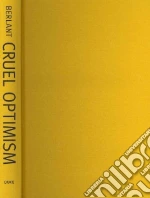 Title :
Cruel Optimism
Title :
Cruel OptimismAuthor: Berlant Lauren Publisher: Duke Univ Pr A relation of cruel optimism exists when something you desire is actually an obstacle to your flourishing. Offering bold new ways of conceiving the present, Lauren Berlant describes the cruel optimism that has prevailed since the 1980s, as the social-democratic promise of the postwar period in the United States and Europe has retracted. People have remained attached to unachievable fantasies of the good life—with its promises of upward mobility, job security, political and social equality, and durable intimacy—despite evidence that liberal-capitalist societies can no longer be counted on to provide opportunities for individuals to make their lives “add up to something.” Arguing that the historical present is perceived affectively before it is understood in any other way, Berlant traces affective and aesthetic responses to the dramas of adjustment that unfold amid talk of precarity, contingency, and crisis. She suggests that our stretched-out present is characterized by new modes of temporality, and she explains why trauma theory—with its focus on reactions to the exceptional event that shatters the ordinary—is not useful for understanding the ways that people adjust over time, once crisis itself has become ordinary. Cruel Optimism is a remarkable affective history of the present. € 89,10
|
 Title :
Cruel Optimism
Title :
Cruel OptimismAuthor: Berlant Lauren Publisher: Duke Univ Pr A relation of cruel optimism exists when something you desire is actually an obstacle to your flourishing. Offering bold new ways of conceiving the present, Lauren Berlant describes the cruel optimism that has prevailed since the 1980s, as the social-democratic promise of the postwar period in the United States and Europe has retracted. People have remained attached to unachievable fantasies of the good life—with its promises of upward mobility, job security, political and social equality, and durable intimacy—despite evidence that liberal-capitalist societies can no longer be counted on to provide opportunities for individuals to make their lives “add up to something.” Arguing that the historical present is perceived affectively before it is understood in any other way, Berlant traces affective and aesthetic responses to the dramas of adjustment that unfold amid talk of precarity, contingency, and crisis. She suggests that our stretched-out present is characterized by new modes of temporality, and she explains why trauma theory—with its focus on reactions to the exceptional event that shatters the ordinary—is not useful for understanding the ways that people adjust over time, once crisis itself has become ordinary. Cruel Optimism is a remarkable affective history of the present. € 24,30
|
|
2008 |
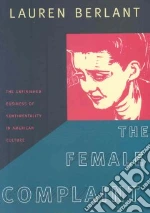 Title :
Female Complaint
Title :
Female ComplaintAuthor: Berlant Lauren Publisher: Duke Univ Pr The Female Complaint is part of Lauren Berlant's groundbreaking “national sentimentality” project charting the emergence of the U.S. political sphere as an affective space of attachment and identification. In this book, Berlant chronicles the origins and conventions of the first mass-cultural “intimate public” in the United States, a “women's culture” distinguished by a view that women inevitably have something in common and are in need of a conversation that feels intimate and revelatory. As Berlant explains, “women's” books, films, and television shows enact a fantasy that a woman's life is not just her own, but an experience understood by other women, no matter how dissimilar they are. The commodified genres of intimacy, such as “chick lit,” circulate among strangers, enabling insider self-help talk to flourish in an intimate public. Sentimentality and complaint are central to this commercial convention of critique; their relation to the political realm is ambivalent, as politics seems both to threaten sentimental values and to provide certain opportunities for their extension. Pairing literary criticism and historical analysis, Berlant explores the territory of this intimate public sphere through close readings of U.S. women's literary works and their stage and film adaptations. Her interpretation of Uncle Tom's Cabin and its literary descendants reaches from Harriet Beecher Stowe to Toni Morrison's Beloved, touching on Shirley Temple, James Baldwin, and The Bridges of Madison County along the way. Berlant illuminates different permutations of the women's intimate public through her readings of Edna Ferber's Show Boat; Fannie Hurst's Imitation of Life; Olive Higgins Prouty's feminist melodrama Now, Voyager; Dorothy Parker's poetry, prose, and Academy Award–winning screenplay for A Star Is Born; the Fay Weldon novel and Roseanne Barr film The Life and Loves of a She-Devil; and the queer, avant-garde film Showboat 1988–The Remake. The Female Complaint is a major contribution from a leading Americanist. € 26,50
|
|
|
2002 |
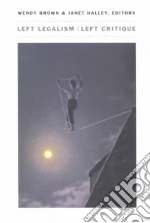 Title :
Left Legalism/Left Critique
Title :
Left Legalism/Left CritiqueAuthor: Brown Wendy (EDT), Halley Janet E. (EDT), Ford Richard T. (CON), Berlant Lauren (CON) Publisher: Duke Univ Pr In recent decades, left political projects in the United States have taken a strong legalistic turn. From affirmative action to protection against sexual harassment, from indigenous peoples' rights to gay marriage, the struggle to eliminate subordination or exclusion and to achieve substantive equality has been waged through courts and legislation. At the same time, critiques of legalism have generally come to be regarded by liberal and left reformers as politically irrelevant at best, politically disunifying and disorienting at worst. This conjunction of a turn toward left legalism with a turn away from critique has hardened an intellectually defensive, brittle, and unreflective left sensibility at a moment when precisely the opposite is needed. Certainly, the left can engage strategically with the law, but if it does not also track the effects of this engagement—effects that often exceed or even redound against its explicit aims—it will unwittingly foster political institutions and doctrines strikingly at odds with its own values. Brown and Halley have assembled essays from diverse contributors—law professors, philosophers, political theorists, and literary critics—united chiefly by their willingness to think critically from the left about left legal projects. The essays themselves vary by topic, by theoretical approach, and by conclusion. While some contributors attempt to rework particular left legal projects, others insist upon abandoning or replacing those projects. Still others leave open the question of what is to be done as they devote their critical attention to understanding what we are doing. Above all, Left Legalism/Left Critique is a rare contemporary argument and model for the intellectually exhilarating and politically enriching dimensions of left critique—dimensions that persist even, and perhaps especially, when critique is unsure of the intellectual and political possibilities it may produce. Contributors: Lauren Berlant, Wendy Brown, Judith Butler, Drucilla Cornell, Richard T. Ford, Katherine M. Franke, Janet Halley, Mark Kelman, David Kennedy, Duncan Kennedy, Gillian Lester, Michael Warner € 28,40
|
|
|
1997 |
 Title :
The Queen of America Goes to Washington City
Title :
The Queen of America Goes to Washington CityAuthor: Berlant Lauren Gail, Barale Michele Aina (EDT), Goldberg Jonathan (EDT), Moon Michael (EDT) Publisher: Duke Univ Pr In The Queen of America Goes to Washington City, Lauren Berlant focuses on the need to revitalize public life and political agency in the United States. Delivering a devastating critique of contemporary discourses of American citizenship, she addresses the triumph of the idea of private life over that of public life borne in the right-wing agenda of the Reagan revolution. By beaming light onto the idealized images and narratives about sex and citizenship that now dominate the U.S. public sphere, Berlant argues that the political public sphere has become an intimate public sphere. She asks why the contemporary ideal of citizenship is measured by personal and private acts and values rather than civic acts, and the ideal citizen has become one who, paradoxically, cannot yet act as a citizen—epitomized by the American child and the American fetus. As Berlant traces the guiding images of U.S. citizenship through the process of privatization, she discusses the ideas of intimacy that have come to define national culture. From the fantasy of the American dream to the lessons of Forrest Gump, Lisa Simpson to Queer Nation, the reactionary culture of imperilled privilege to the testimony of Anita Hill, Berlant charts the landscape of American politics and culture. She examines the consequences of a shrinking and privatized concept of citizenship on increasing class, racial, sexual, and gender animosity and explores the contradictions of a conservative politics that maintains the sacredness of privacy, the virtue of the free market, and the immorality of state overregulation—except when it comes to issues of intimacy. Drawing on literature, the law, and popular media, The Queen of America Goes to Washington City is a stunning and major statement about the nation and its citizens in an age of mass mediation. As it opens a critical space for new theory of agency, its narratives and gallery of images will challenge readers to rethink what it means to be American and to seek salvation in its promise. € 26,20
|
|
|
1991 |
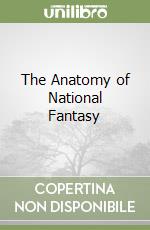 Title :
The Anatomy of National Fantasy
Title :
The Anatomy of National FantasyAuthor: Berlant Lauren Gail Publisher: Univ of Chicago Pr Examining the complex relationships between the political, popular, sexual, and textual interests of Nathaniel Hawthorne's work, Lauren Berlant argues that Hawthorne mounted a sophisticated challenge to America's collective fantasy of national unity. She shows how Hawthorne's idea of citizenship emerged from an attempt to adjudicate among the official and the popular, the national and the local, the collective and the individual, utopia and history. At the core of Berlant's work is a three-part study of The Scarlet Letter, analyzing the modes and effects of national identity that characterize the narrator's representation of Puritan culture and his construction of the novel's political present tense. This analysis emerges from an introductory chapter on American citizenship in the 1850s and a following chapter on national fantasy, ranging from Hawthorne's early work 'Alice Doane's Appeal' to the Statue of Liberty. In her conclusion, Berlant suggests that Hawthorne views everyday life and local political identities as alternate routes to the revitalization of the political and utopian promises of modern national life. € 39,30
|